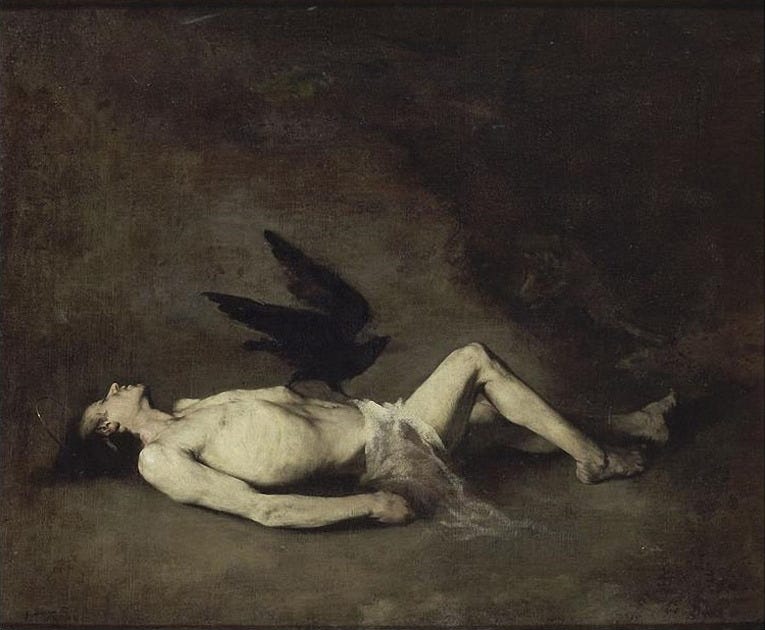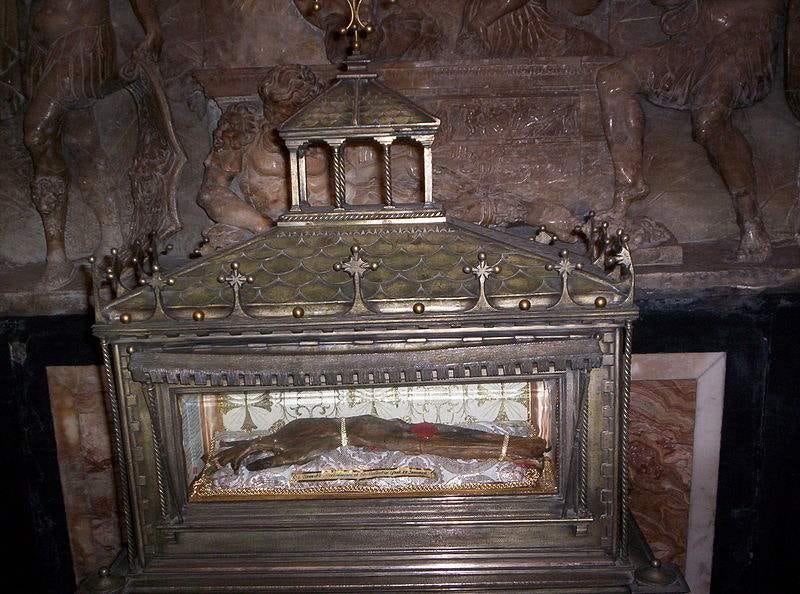Today is the Feast Day of St. Vincent of Saragossa
Deacon and Martyr
Deacon of Saragossa, and martyr under Diocletian, 304; mentioned in the Roman Martyrology, 22 Jan., with St. Anastasius the Persian, honored by the Greeks, 11 Nov. This most renowned martyr of Spain is represented in the dalmatic of a deacon, and has as emblems a cross, a raven, a grate, or a fire-pile. He is honored as patron in Valencia, Saragossa, Portugal etc., is invoked by vintners, brickmakers, and sailors, and is in the Litany of the Saints. His Acts were read in the churches of Africa at the end of the fourth century, as St. Augustine testifies in Sermon 275. The present Acts (Acta SS., III Jan., 6) date from the eighth or ninth century, and were compiled from tradition. Anal. Boll., I, 259, gives another life. All agree in substance with the metric life by Prudentius (P.L., LX, 378). He was born at Saragossa; his father was Eutricius (Euthicius), and his mother, Enola, a native of Osca. Under the direction of Valerius, Bishop of Sargossa, Vincent made great progress in his studies. He was ordained deacon and commissioned to do the preaching in the diocese, the bishop having an impediment of speech. By order of the Governor Dacian he and his bishop were dragged in chains to Valencia and kept in prison for a long time. Then Valerius was banished, but Vincent was subjected to many cruel torments, the rack, the gridiron, and scourgings. He was again imprisoned, in a cell strewn with potsherds. He was next placed in a soft and luxurious bed, to shake his constancy, but here he expired.
His body was thrown to be devoured by vultures, but it was defended by a raven. Dacian had the body cast into the sea, but it came to shore and was buried by a pious widow. After peace was restored to the Church, a chapel was built over the remains outside the walls of Valencia. In 1175 the relics were brought to Lisbon; others claim that they came to Castres in 864. Cremona, Bari, and other cities claim to have relics. Childeric I brought the stole and dalmatic to Paris in 542, and built a church in honor of St. Vincent, later called St-Germain-des-Prés. Regimont, near Bezières, had a church of the saint as early as 455. Rome had three churches dedicated to St. Vincent; one near St. Peter's, another in Trastevere, and the one built by Honorius I (625-38) and renewed by Leo III in 796. A pilaster found in the basilica of Salona in Dalmatia shows an inscription of the fifth or sixth century in honor of the saint (Rom. Quartalschrift, 1907, Arch. 135).
Source: The Catholic Encyclopedia
A sermon of St Augustine on the feast day of St Vincent
Vincent was victorious in him by whom the world was vanquished
To you, said the Apostle Paul, it has been granted for Christ, not only to believe in him, but also to suffer for him.
Vincent had received both these gifts; he had received them, and he kept them. After all, if he had not received them, what would he have had? But he did have faithfulness in his words, he did have endurance in his sufferings.
So do not any of you be too self-assured when offering a word; do not be too confident in your own powers when suffering trials or temptations; because it is from him that we have the wisdom to speak good things wisely, from him the patience to endure bad things bravely.
Call to mind the Lord Christ warning and encouraging his disciples in the gospel; call to mind the king of martyrs equipping his troops with spiritual weapons, indicating the wars to be fought, lending assistance, promising rewards; first saying to his disciples, In this world you will have distress; then immediately adding words that would allay their terrors: But have confidence: I myself have vanquished the world.
So why should we be surprised, dearly beloved, if Vincent was victorious in him by whom the world was vanquished? In this world, he says, you will have distress; such that, even if it distresses, it cannot oppress you; even if it knocks you down, it cannot knock you out. The world mounts a double attack on the soldiers of Christ. It wheedles in order to lead them astray; but it also terrifies, in order to break them. Let us not be held fast by our own pleasures, let us not be terrified by someone else’s cruelty, and the world has been vanquished.
At each attack, Christ comes running to the defense, and the Christian is not vanquished. If, in this passion of Vincent’s, one only gave thought to human powers of endurance, it would begin to look unbelievable; but if one acknowledges divine power, it ceases even to be wonderful.
Such hideous cruelty was being unleashed on the martyr’s body, and such calm serenity was displayed in his voice; such harsh, savage punishments being applied to his limbs, but such assurance echoing in his words, that we would have imagined that in some marvelous way, while Vincent was suffering, that it was someone else and not the speaker that was being tortured.
And indeed, my dearest brethren, that is how it was; undoubtedly that is how it was: someone else was speaking. Christ, you see, promised even this to his witnesses in the gospel, when he was preparing them for this sort of contest. For he said: Do not think beforehand about how or what you are to speak. For it is not you that are speaking, but the Spirit of my Father who is speaking in you.
So the flesh was suffering, and the Spirit was speaking. And while the Spirit was speaking, not only was ungodliness being confounded and convicted, but weakness was even being strengthened and comforted.
Let us pray.
Eternal Father, you gave Saint Vincent the courage to endure torture and death for the gospel: fill us with your Spirit and strengthen us in your love.
We ask this through our Lord Jesus Christ, your Son, who lives and reigns with you in the unity of the Holy Spirit, God, for ever and ever.
Amen.




